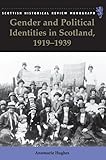Gender and Political Identities in Scotland, 1919-1939 / Annmarie Hughes.
Material type: TextSeries: Scottish Historical Review Monographs : SHRMPublisher: Edinburgh : Edinburgh University Press, [2022]Copyright date: ©2010Description: 1 online resource (248 p.)Content type:
TextSeries: Scottish Historical Review Monographs : SHRMPublisher: Edinburgh : Edinburgh University Press, [2022]Copyright date: ©2010Description: 1 online resource (248 p.)Content type: - 9780748639816
- 9780748641864
- 305.409411
- online - DeGruyter
| Item type | Current library | Call number | URL | Status | Notes | Barcode | |
|---|---|---|---|---|---|---|---|
 eBook
eBook
|
Biblioteca "Angelicum" Pont. Univ. S.Tommaso d'Aquino Nuvola online | online - DeGruyter (Browse shelf(Opens below)) | Online access | Not for loan (Accesso limitato) | Accesso per gli utenti autorizzati / Access for authorized users | (dgr)9780748641864 |
Frontmatter -- Contents -- Tables -- Acknowledgements -- Introduction -- Chapter one. Usurpers of Men? Gender, Work and Political Identities -- Chapter two. Socialist Women, the ILP and the ‘Politics of the Kitchen’ -- Chapter three. Class Fragmentation: Respectability, Religion and Residence -- Chapter four ‘A Docile Workforce’? Women, Work and Political Identity -- Chapter five. Socialist Women, Feminists and Feminism -- Chapter six. The Politics of Marriages of Conflict -- Chapter seven. Marriage, Mothering and Political Identity -- Chapter eight. Gender and the Politics of Everyday Life -- Conclusion -- Bibliography -- Index
restricted access online access with authorization star
http://purl.org/coar/access_right/c_16ec
This work offers a unique contribution to gender and Scottish history breaking new ground on several fronts: there is no history of inter-war women in Scotland, very little labour or popular political history and virtually nothing published on women, the home and family. This book is a history of women in the period which integrates class and gender history as well as linking the public and private spheres. Using a gendered approach to history it transforms and shifts our knowledge of the Scottish past, unearthing the previously unexplored role which women played in inter-war socialist politics, the General Strike and popular political protest. It re-evaluates these areas and demonstrates the ways in which gender shaped the experience of class and class struggle. Importantly, the book also explores the links between the public and private spheres and addresses the concept of masculinity as well as femininity and pays particular reference to domestic violence. The strength of the book is the ways in which it illuminates the complex interconnections of culture and economic and social structure. Although the research is based on Scottish evidence, it also uses material to address key debates in gender history and labour history which have wider relevance and will appeal to gender historians, labour historians and social and cultural historians as well as social scientists.
Mode of access: Internet via World Wide Web.
In English.
Description based on online resource; title from PDF title page (publisher's Web site, viewed 29. Jun 2022)


